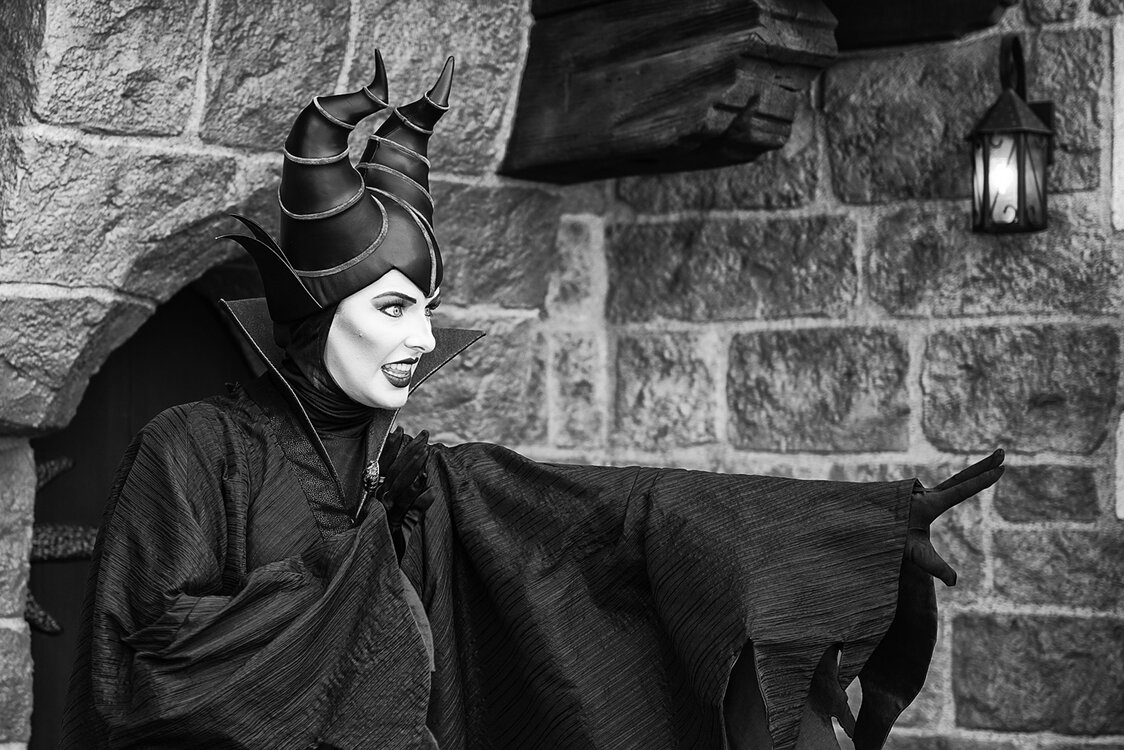Fairies in Neverland Part III: Maleficent
Maleficent is one of the most powerful villains in the Disney pantheon, rivaled perhaps only by Jafar. Unlike Ursula or the Evil Queen, Maleficent doesn’t need to follow a ritual or prepare a potion to use her powers - they are instantaneously available to her the moment she wants to use them. Given the broad powers at Maleficent’s disposal, it is curious that she is defeated at all, never mind by a human prince and three fairies who are comparatively weak, at least based on the magic done in the film. Maleficent curses Aurora to die before the end of her 16th birthday in less than two minutes, while the three good fairies, despite their combined powers, expertise, and sixteen years of working time can only weaken the curse, not break it. This, along with the other powers Maleficent demonstrates in the film (teleportation, mass summoning, bodily manipulation), suggests that she is wildly powerful in the universe she inhabits. Why then, is she defeated? The film places emphasis on collective action - Philip’s sword is enchanted by the three fairies in unison, and this is ultimately what kills her.
To animate the tension between Maleficent’s powers and how they are overcome, it is useful to understand her particular queerness and spin out the allegory from there. As others have noted, Maleficent’s embodiment itself is queer: she is drawn with masculine, angular features, lacking the curvature and softness of other female characters in the film. Her cold, aggressive demeanor stands in juxtaposition to the warm femininity expected of typical heterosexual women. These nonconformities make her undesirable as a straight man’s mate (perhaps by her own choosing) and thus decidedly queer. Moreover, Maleficent and her queerness stand in the way of the King’s heterosexuality - if Aurora dies before she reaches reproductive maturity, then his lineage cannot continue and the royal biopolitic is thwarted.
If we read Maleficent as queer, and her defeat as the defeat of queerness’ interference in heterosexual reproduction (the three fairies’ effort to raise Aurora to reproductive maturity), then the allegory becomes clear. Queerness, despite its deeply compelling offer of freedom and power, even at the price of exile, must be defeated by collective social action. In Sleeping Beauty, this defeat is grounded in a good vs. evil narrative, meaning that not only is the defeat of queerness the defeat of evil, but queerness must necessarily be defeated because good always wins. The phallic imagery of the sword is not lost either. The three “good” fairies enchant Philip’s blade so that he can defeat Maleficent. Allegorically, this corresponds to “good” or “proper” social values christening straight men’s penises so they can fulfill their reproductive duties and thereby perpetuate heterosexuality as a biopolitic.
Like Ursula, Hook, and other queer-coded Disney villains, Maleficent’s exile is never explained. In the original film, we never learn what causes a rift between her and the other fairies or why she isn’t invited to Aurora’s christening. She, like queerness, is axiomatically evil and shunned. Her exile must be assumed because it would otherwise invite questions, and pulling on those strings reveals there isn’t a good reason for her anathema status.
The same is true with queerness - if you don’t assume queerness is evil, you actually have to rationalize why it’s bad - a task that proves fruitless.
In the 1959 film, Maleficent is addressed as “Your Excellency” by Queen Leah. Historically, this would imply that she was a high ranking official or head of state. It’s difficult to imagine her holding a position of power in King Stefan’s Court - she was, after all, uninvited and unwanted at his daughter’s christening. Since no mention of a superior is made, we can assume she is in the highest position of the government she leads - a foreign head of state. Her animators would have us imagine that she is a cruel monarch, controlling her subjects by erecting walls of thorns and striking down her political opponents with lightning. But I ask that we free her from the shackles of queer villainy and imagine a different kind of sovereign. What if, instead of cursing Aurora for being the subject of a biopolitical apparatus that excludes her, Maleficent teaches Aurora to use her political capital to dismantle heteropatriarchy? In other words, what if Maleficent frees Aurora from the notion that she has to marry a prince, reproduce, and further the royal bloodline and teaches her queer magic instead? She and Maleficent could imagine a new kingdom, without royalty, where all people - regardless of their queerness or intent/ability to reproduce - are welcomed. At a more basic level, what could Maleficent accomplish if she didn’t have to be evil? Who could she become if she wasn’t written to die?
